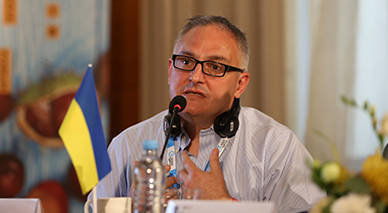
During the last year, understanding and positioning of creative industries appeared in Ukrainian society. This is associated with the strengthening of our audiovisual market. It has grown thanks to the new Ukrainian Cultural Fund, film financing programs and international subprograms for content support and development. Besides, Ministry of Economic Development and Trade develops an export strategy of creative industries within Export Strategy Ukraine approved by the government on December 27, 2017. For the first time such document envisages creation of conditions for developing export specifically for creative economy.
On September 19 at KYIV MEDIA WEEK international media forum, a roundtable discussion took place under the title “Support of creative industries in Ukraine: what’s new?”. The event featured Diana Popova, director for department of culture at Kyiv City State Administration (KCSA); Simon Williams, director at British Council Ukraine and cultural attache; Yuriy Rybachuk, deputy Minister of Culture; Philip Illenko, head of Ukrainian State Film Agency; Anna Sukhodolskaya, head of communications department at UNICEF development section; Irina Prokofyeva, head of program department at the Ukrainian Institute; and Lyubov Krokhmalnaya, director for development of international co-production at MRM who moderated the panel.
The main topics for discussion were the mid-term development strategies of the represented institutions and also the requirements each organization puts towards applicants for financing.
KCSA representative Diana Popova noted that in Kyiv more and more exciting cultural projects emerge every year, but a successful content strategy unfortunately doesn’t always mean an efficient marketing strategy. Despite that the administration is predominantly interested in the cultural, not commercial component and plans to expand its activities via the support of new cultural initiatives. The projects which received financing from the administration in the recent years include festivals such as Kyiv Light Fest, Kyiv Art Week, Krok, Children Kinofest, Open Night, Molodist, Docudays UA, Linoleum, etc.
In his turn, Simon Williams agreed that there often emerges a situation when people working in culture don’t have experience in organizing, managing and marketing a business, and one of the critical tasks is to inform them about existing opportunities and to teach them the right way to submit the necessary applications in a timely manner. As the British Council representative, Williams stressed that most projects this institution is working on envisage co-financing (from both the British Council and the European Commission), so it is possible to obtain a grant for the projects already cooperating with other organizations, including public ones.
The following speaker was deputy Minister of Culture Yuriy Rybachuk who informed that this year Ukraine defined the notion of creative industries in legislation for the first time. He also noted that the ministry’s priorities for the next several years include promoting the creation and distribution of new television content, and Ukrainian TV producers can get financing for TV production within the program supporting patriotic cinema. Yuriy Rybachuk was then supported by Philip Illenko who reminded the audience that while the Ministry of Culture has a task to form policy in the cinema field, the State Film Agency’s task is to enforce it. According to Illenko, the main goal of the agency is to build a durable film industry and to establish a set of rules according to which it will work. The following necessary step for this will be a full-fledged introduction of a cash rebate system.
In her turn, Anna Sukhodolskaya reminded that audience that for UNICEF children’s problems remain the main issue, and the organization is predominantly socially oriented. Creative industries are seen by the organization as a way to achieve its goals, and films are often used for human rights advocacy. For example, projects implemented with the support of UNICEF include films about children who suffered in military conflicts. Sukhodolskaya stressed that the organization is ready to finance socially significant projects, including co-financing with other institutions.
The discussion block was adjourned by the speech from Irina Prokofyeva who told about the tasks of recently inaugurated Ukrainian Institute under the jurisdiction of the Ministry of Foreign Affairs. Ukrainian Institute is supposed to be a Ukrainian analogue of such organizations as Institut Polski and Alliance Francaise. It will be forming cultural image of Ukraine on the international arena and will create opportunities for representatives of Ukrainian cultural industries abroad. For now Ukrainian Institute is at the shaping and programming stage but in the future it plans to become a communications hub helping Ukrainian content, among other things, to make it to a totally new level with the help of international cooperation.